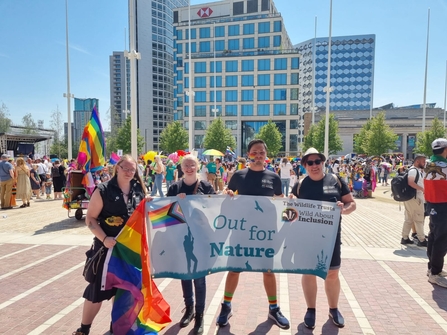It’s Pride month!
In memory of the 1969 Stonewall riots, June marks LGBTQ+ Pride month, where we celebrate the lives and identities of the Lesbian, Gay, Bisexual, Transgender and Queer communities.
As part of our commitment to Equality, Diversity & Inclusion (EDI), we highlight awareness days and months relevant to our work or to our staff and volunteers. The Wildlife Trusts encourage all staff to bring their whole self to work, which means celebrating our diversity and raising awareness about issues affecting our communities. By being an inclusive organisation, we are giving everyone the opportunity to do their best to help nature and conservation efforts.
One of the key aims of The Wildlife Trusts is to encourage 1 in 4 people to take action for nature. There are many people in the LGBTQ+ community who have a true affinity and compassion for nature. 15% of Wildlife Trust staff members are LGB+ (lesbian, gay and bisexual), well above the national average of 3.3%, and 0.6% are transgender, which is slightly higher than the UK in general. With so many LGBTQ+ staff members it is really important for us to talk about and celebrate Pride.
Many of the LGBTQ+ community are no stranger to campaigning for things they believe in and causes that matter due to the need to fight for their own personal rights over the years. The Stonewall riots took place in 1969 at the Stonewall Inn in New York, when police raided a gay bar resulting in a week of rioting and protest. Spearheaded by black trans women, LGBTQ+ people stood up against oppression alongside allies of all kinds, in the face of overwhelming odds.


